Quest for green spaces makes good business sense
Low-carbon lifestyle increasingly favored by young people and is influencing design, energy and construction parameters in a number of key sectors


McDonald's China owns the largest number of LEED-certified projects globally. Over 3,600 restaurants in China are LEED certified, accounting for over half of its total restaurants in the country, covering 29 provincial-level regions in the Chinese mainland.
McDonald's China has been applying LEED volume program across its restaurants since 2018, advancing green practices nationwide while developing flagship projects. On top of this, three LEED Zero Carbon restaurants have already been completed, setting a new standard for sustainability in China's food industry. Their approach also drives suppliers, contractors, and designers to adapt to evolving sustainability standards.
"With McDonald's China's large scale and rapid pace of expansion, we have developed a standardized and replicable LEED certification prototype, enabling 100 percent of our new restaurants to achieve LEED certification standard and continuously lead in green restaurant development.
"Given the complexity of our restaurant operations and the wide range of equipment, we remain committed to enhancing energy efficiency and reducing carbon emissions — while ensuring operational performance — to align with LEED standards," said Doni Ma, vice-president of McDonald's China National Construction, Design, Equipment and Facility.
In the logistics segment, there are a number of enterprises that have adopted green building. Singapore-headquartered real estate company Mapletree Investments Pte Ltd is among the first movers in LEED within the logistics sector in China. Its team adopted various innovative approaches and actions to drive its sustainability journey.
To date, over 60 percent, or 400 of Mapletree's assets have obtained LEED certifications globally. Out of them, over 350 belong to Mapletree China's logistics assets, with more than 75 percent awarded the LEED Gold-level and Platinum-level certifications. These certifications cover an area of over 6.6 million square meters.
"We aim to install over 180 megawatt peak of solar energy for our China logistics assets by 2030, and achieve 100 percent green building certification for China's logistics and commercial assets by 2035," said Goh Chye Boon, regional CEO of Mapletree China.
The latest report issued by the USGBC said that the Chinese mainland once again ranked first in the world on its annual list of Top 10 Countries and Regions for LEED in 2024. This has been the ninth consecutive year that the Chinese mainland has topped the list.
The ranking highlights countries and regions outside the US that are making significant strides in healthy, sustainable building design, construction and operations. Last year, 1,860 LEED green building projects, representing more than 25 million square meters of space, were LEED-certified in the Chinese mainland.
According to USGBC, in 2024, in terms of the number of LEED certified projects, Shanghai ranked top among all cities in China, followed by Beijing, Shenzhen and Guangzhou in Guangdong province, Suzhou in Jiangsu province, and Hangzhou.
On April 28, USGBC officially launched the latest version of the LEED rating system — LEED v5. As an updated and reinforced version of the previous ones, v5 focuses on three major aspects: decarbonization, quality of life, and ecological conservation and restoration. When applying for a LEED certification, enterprises will be rated in the three major aspects, which better fit into their corporate sustainability goals.
"Since its introduction in 2000, LEED has fundamentally reshaped the way buildings and communities are designed, built, and operated — transforming the ecology of cities around the world. As the global demand for sustainable development continues to grow, our rating systems must evolve to meet the moment. Through LEED, we aim to help buildings and communities address pressing environmental challenges, safeguard human health, and remain resilient in the face of change — ultimately contributing to a better world and better lives," Wang said.
The journal China Venture Capital estimated that by the end of 2025, China's green building industry is estimated to surpass 1.3 trillion yuan ($181 billion).




































